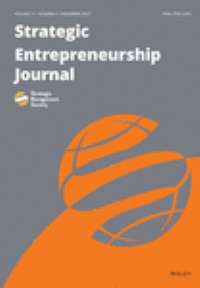Are non‐economic goals and financial performance friends or foes in hybrid ventures? A duality perspective on academic spin‐offs
IF 6.3
2区 管理学
Q1 BUSINESS
引用次数: 0
Abstract
Research SummaryThis study draws on the behavioral theory of the firm and a duality perspective to investigate the impact of founders' focus on academic goals on the financial performance of academic spin‐offs (ASOs)—a specific type of hybrid venture. We theorize that such relationship follows an inverse U‐shaped curve and is moderated by the degree of academic ownership. These hypotheses are tested using a sample of 179 Italian ASOs. Our findings indicate that when academic ownership is low, the relationship displays an inverted U‐shape. Moreover, as academic ownership increases, the relationship flattens and eventually shifts to a U‐shape. These results challenge the prevailing notion of inherent conflicts between economic and non‐economic logics in hybrid ventures, demonstrating when focusing on non‐economic (e.g., academic) goals enhances financial outcomes.Managerial SummaryAcademic spin‐offs (ASOs) play a pivotal role in science commercialization and often pursue academic goals due to their academic origins. However, the extent to which founders' focus on academic goals benefits or hinders ASOs' financial performance has remained largely underexamined. In this study of 179 Italian ASOs, we investigate the relationship between a focus on academic goals and firm performance. Our findings reveal that at lower levels of academic ownership, a moderate focus on academic goals is optimal for ASOs' financial performance. Conversely, at higher levels of academic ownership, either a low or high focus on academic goals proves optimal for financial performance. These insights can help practitioners improve ASO performance by aligning goal and ownership structures.在混合型企业中,非经济目标和财务表现是朋友还是敌人?学术衍生的二元视角
本研究利用公司行为理论和二元视角来研究创始人对学术分拆(ASOs)财务绩效的影响,ASOs是一种特殊类型的混合企业。我们的理论认为,这种关系遵循一个反U形曲线,并受到学术所有权程度的调节。这些假设使用179个意大利aso样本进行了检验。我们的研究结果表明,当学术拥有度较低时,这种关系呈现倒U形。此外,随着学术所有权的增加,这种关系趋于平缓,并最终转变为U形。这些结果挑战了混合企业中经济和非经济逻辑之间固有冲突的流行观念,表明当专注于非经济(如学术)目标时,会提高财务结果。学术衍生品(ASOs)在科学商业化中发挥着关键作用,往往由于其学术起源而追求学术目标。然而,创始人对学术目标的关注在多大程度上有利于还是阻碍了ASOs的财务业绩,这一点在很大程度上仍未得到充分研究。在对179家意大利上市公司的研究中,我们调查了对学术目标的关注与公司绩效之间的关系。我们的研究结果表明,在较低的学术所有权水平下,适度关注学术目标是ASOs财务绩效的最佳选择。相反,在较高的学术所有权水平上,对学术目标的低或高关注证明对财务绩效是最优的。这些见解可以帮助实践者通过调整目标和所有权结构来提高ASO性能。
本文章由计算机程序翻译,如有差异,请以英文原文为准。
求助全文
约1分钟内获得全文
求助全文
来源期刊

Strategic Entrepreneurship Journal
Multiple-
CiteScore
11.10
自引率
1.60%
发文量
31
期刊介绍:
The Strategic Entrepreneurship Journal is a research journal that publishes original work recommended by a developmental, double-blind review process conducted by peer scholars. Strategic entrepreneurship involves innovation and subsequent changes which add value to society and which change societal life in ways which have significant, sustainable, and durable consequences. The SEJ is international in scope and acknowledges theory- and evidence-based research conducted and/or applied in all regions of the world. It is devoted to content and quality standards based on scientific method, relevant theory, tested or testable propositions, and appropriate data and evidence, all replicable by others, and all representing original contributions. The SEJ values contributions which lead to improved practice of managing organizations as they deal with the entrepreneurial process involving imagination, insight, invention, and innovation and the inevitable changes and transformations that result and benefit society.
 求助内容:
求助内容: 应助结果提醒方式:
应助结果提醒方式:


